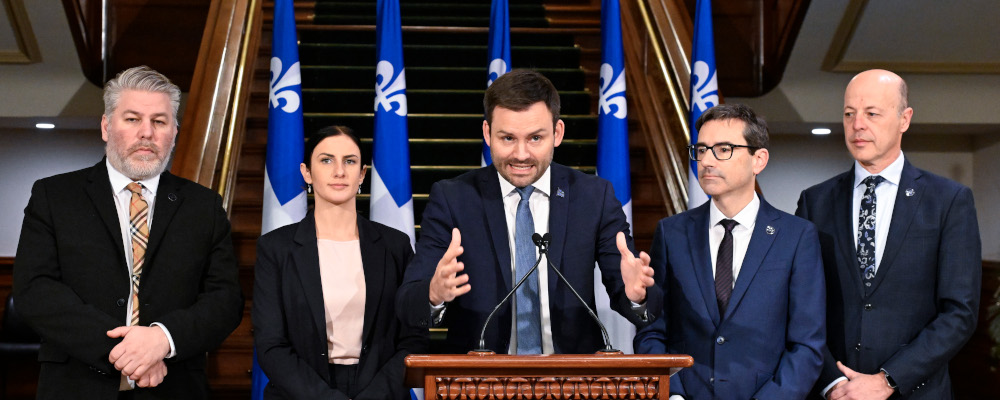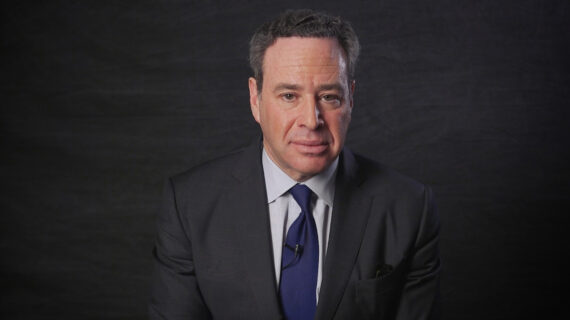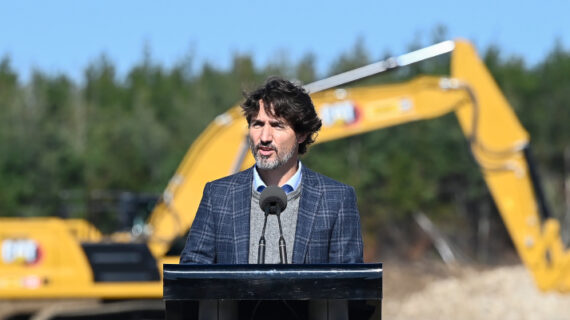- Quebec Premier Francois Legault was once seen as the most popular premier in Canada. Today he may be the least popular and support for his CAQ party has fallen sharply.
- If a Quebec election were held tomorrow, the separatist Parti Québecois (PQ) would win a strong minority government in the provincial legislature, polls report.
- Experts interviewed by The Hub say the beleaguered premier still has time to turn things around given that the next election is more than two years away.
Although a Quebec election isn’t expected for a couple of years, if it were held tomorrow, the separatist Parti Québecois (PQ) would win a strong minority government. One recent December poll shows the governing Coalition Avenir Québec (CAQ), once a party that appeared it could do no wrong, dropping 16 points in a year, with the PQ gaining 16 points. Premier Legault’s five-year-long honeymoon may now be over.
Only a little over a year ago, the CAQ was riding high, having won its largest majority in which it gained 90 of 125 seats in the National Assembly in the 2022 provincial election. Four years previous, the seven-year-old party won their first landslide majority victory, claiming 74 seats. The party had slain the Liberal and PQ dragons that had run the province for nearly half a century.
Today, according to the polling aggregate site 338Canada.com, the CAQ would win just 19 seats. The PQ would jump from four to 57 seats.
Pitching themselves as a new nationalist but non-sovereignist party with pragmatic centre-right policies on the economy and cultural issues, the CAQ once seemed unassailable. CAQ leader and co-founder Francois Legault was seen as the most popular premier in the country, even during the height of the Quebec pandemic lockdowns he implemented, which were some of the most intense in the world. He was lauded for his “folksy charm” and “optimism”. Today, some polls list Legault as Canada’s least popular premier.
Feeling the pinch
According to 338’s founder Philippe Fournier, Québecers are feeling the same economic pain the rest of Canadians are experiencing, but rather than pointing the finger at the prime minister, they are pointing it at their premier.
“Many Canadians outside of Québec blame the Trudeau government for the cost of living and inflation,” says Fournier. “[But] [t]he first government for Quebec voters is the Quebec government, it’s not the federal government.”
Rodolphe Husny, a Quebec consultant, political commentator, and former advisor to Prime Minister Stephen Harper, says Legault must make challenging changes to the way he governs to turn the ship around.
“Legault himself, when he was re-elected, said it’s important to have courage in politics,” says Husny. “But the reality is that when he had to make tough choices, sometimes he didn’t make them.”
Fournier agrees Legault’s personal missteps have contributed to this swift decline in the popularity of his party.
“2023 has not been a good year for Legault in general because he himself has looked uncertain at times,” says Fournier. He lays out that the CAQ has made several big communication mistakes with the public.
Quebec City: a flashpoint frustrations
One of the major missteps commentators point to is Premier Legault’s broken promise to build a multibillion-dollar mixed-vehicle third crossing over the St. Lawrence River, between Quebec City and the suburb of Lévis. Last April, the provincial government scaled back its plans in a big way, announcing the bridge would only service public transit.
In October, a PQ candidate emerged victorious by a margin of 23 points over their CAQ opponent in a byelection held in the Quebec City riding of Jean-Talon. Within 24 hours, Legault then announced he was prepared to begin new consultations on the third crossing.
Quebec City continued to cause headaches for Legault’s government.
In November, the CAQ again found themselves under fire for announcing that as much as $7 million in public funds would be spent hosting the National Hockey League’s Los Angeles Kings for a 2024 pre-season game in the capital city.
Husny says the decision to pay for millionaire hockey players to play a non-regular season game in Quebec City was a tipping point for many voters.
“That’s when basically everybody said, ‘What kind of management is that?’” says Husny. “In a way, it was a very important coup de grâce, and it showed that the government was in disarray.”
Affordability hits Legault hard
Fournier says the heightened cost of living, inflation, and the housing crisis have all begun to impact Legault’s popularity far more than other premiers in the rest of Canada.
In 2021, when Legault was riding high in the polls, he stated that apartment rent in Montreal started at around $500 or $600 a month, in response to a question about affordability.
At the time, the average rent for a 2-bedroom apartment in Montreal was $903 per month.
Last December, it was reported that rent in Quebec had risen faster than any other province in Canada, at a rate of 10.9 percent annually, driving monthly rents for a two-bedroom apartment in Montreal up to $2,278 per month.
Legault has appeared out of touch on the housing issue.
In the rest of Canada, the federal government headed by Prime Minister Justin Trudeau has largely taken the blame for the housing crisis. Not so in Quebec. Again, voters in the province largely blame their premier.
The CAQ has likely only made matters worse by voting to give provincial politicians in the National Assembly a $30,000 annual raise. All this, in the midst of a cost-of-living crisis.
Impossible to separate Legault and the CAQ
While there is time to improve, the CAQ’s perception as the party of Legault and the nature of its delicate coalition of federalist and sovereigntist voters has raised questions about the CAQ’s long-term viability.
Daniel Béland, director of the McGill Institute for the Study of Canada says the CAQ and its fortunes are firmly tied to Legault’s image.
“It’s not a one-man show, but this is a party that’s really centred around Legault,” the professor admits.
Given that that party is Legault’s creation, Husny says the CAQ is seen first and foremost as his party. Husny says this has proved to be both a benefit and a liability. The CAQ’s broad coalition of federalists and sovereigntists may have helped it win two successive majority governments, but without Legault, there are doubts about its stability.
Husny points out that Legault’s finance minister is a former federal Conservative candidate, his vice premier was once floated as a PLQ candidate, and his education minister is a former PQ MNA.
“You have three key ministers in cabinet who come from three different backgrounds when it comes to federal and provincial politics,” explains Husny. “But, they all serve under the same government because Francois Legault is the mortar in all that, the cement.”
Fournier says the CAQ and the PQ both draw from the same pool of sovereigntist voters, even if many of these voters are not as hardline as they were in the 1990s.
“They left the PQ to support the CAQ in 2018,” says Fournier. “In CAQ, the C stands for Coalition, and this is the danger both for the PQ and for the CAQ.”
Without Legault, says Béland, there is a strong possibility that the CAQ’s coalition will disintegrate.
“The federalist wing and the really strong nationalist, quasi-sovereignist wing could really split apart,” he predicts. “But the proof is in the pudding, right? So we’ll see.”
The PQ’s popular leader is a problem for Legault
Paul St-Pierre Plamondon, the PQ’s leader since 2020, led his party to a poor showing in the 2022 provincial election. The PQ lost four of its seven seats, and its share of the vote declined. But in 2023, his leadership dramatically improved the sovereigntist PQ’s appeal, culminating in the byelection win in Jean-Talon.
Husny says Plamondon was not particularly charismatic when he first became PQ leader but built up that aspect of his leadership by convincing voters he was an authentic politician.
“He was very principled,” says Husny. “For example, when he was first elected, he refused to swear allegiance to the King, and people respected that.”

Plamondon made headlines when he refused to take the traditional oath of allegiance to King Charles III when he was sworn in again as an MNA following the 2022 provincial election.
“[Y]ou can’t serve two masters at the same time,” he said at the time.
In December of the year, the PQ was denied entry to the National Assembly for refusing to swear the oath. This led to the Assembly voting to make the oath optional, which was decried as unconstitutional in the rest of Canada but has not yet been legally challenged.
In the first poll following the 2022 general election, and after Plamondon’s refusal to swear the oath, the PQ climbed 3.4 percent in the polls. The CAQ dropped five points.
However, Fournier and Husny agree that support for the party has little to do with the sovereignty question. Fournier points out that support for a sovereign Quebec remains below 40 percent in surveys.
PQ’s Plamondon unafraid to speak out on contentious issues
Béland says Plamondon has done a good job keeping the PQ on the public radar, despite holding only four seats.
“He’s been quite effective in terms of communications and in terms of always finding new issues to raise to stay on the agenda,” says Béland.
Husny agrees that Plamondon’s willingness to speak out honestly on contentious issues has resonated with voters.
“On immigration and other things, he’s basically saying the way he feels and not to be popular, he’s even criticized wokeness,” says Husny. “Sometimes I think it’s the style or the authenticity more than the charisma, but I think he’s young and energetic.”
Last January, Plamondon lamented how difficult it was to have a “healthy conversation” about immigration after calling for lower levels of immigration into Quebec.
Plamondon also cautioned that dissatisfaction around immigration would be exacerbated if the province could not provide sufficient services to the population. While the PQ leader was accused of xenophobia, polling across Canada, especially in Quebec, has suggested a large majority of Canadians now want lower levels of immigration.
The premier has also stepped into the immigration fray. Just prior to the 2022 provincial election, Legault declared that increased immigration would be “suicidal” for the French language.
Nevertheless, it was reported in November 2023 that the Quebec government would actually increase its immigration levels to 60,000 newcomers this year, albeit with a French-language test for temporary foreign workers.

Other parties in Quebec not benefitting from CAQ’s unpopularity
Even with Legault’s failings, other parties like the Parti libéral du Québec (PLQ), which have historically been the party of choice for federalist voters, and the left-wing and sovereigntist Québec solidaire (QS) have not seen any boost in their polling.
Husny says the PQ deserves credit for being more or less the sole beneficiary of the CAQ’s declining popularity.
“It’s been a 100 percent transfer from the CAQ to the PQ,” says Husny. “The (provincial) Liberals or Québec solidaire have not made any gains.”
The PLQ has not had an official leader since shortly after their poor showing in the 2022 provincial election. With an interim leader, Husny says the Liberals have been unable to benefit from any wavering federalist voters who voted for the CAQ in 2022.
The Parti conservateur du Québec (PCQ), founded in 2009, had never won a seat in the National Assembly. However, under the leadership of Éric Duhaime, the party rose in popularity to the point of nearly winning a handful of seats in the 2022 provincial election. However, they were unsuccessful and remain an extra-parliamentary party.
Béland says the PCQ’s opposition to Quebec’s strict public health mandates during the pandemic gave them a boost at the time. However, he says the Conservatives’ efforts to attack the CAQ by shifting their focus to the economy will be stymied by a lack of parliamentary representation.
“I think that makes it much harder when you don’t have any representation,” says Béland. “Yes, there are cost-of-living issues, but other parties like Québec solidaire, the PQ, and the Liberals are also focusing on that.”
CAQ has time to recover before the next election
Fournier says whether or not the PQ’s surge will last will be revealed soon enough. He adds that the CAQ will have an opportunity to plot out its road to recovery when it presents its spring budget.
“It will be time for the CAQ to prove its strength, which they said was handling the economy, and trying to reduce wait times in the emergency room,” explains Fournier.
Several public sector unions in Quebec had been on strike since November but reached an agreement at the end of 2023. Fournier says the end of the strike means the CAQ are free to refocus on the economy, which he says may be their saving grace.
At the end of the day, the CAQ’s politicians and supporters may be able to reassure one another that their major missteps appear to be mere poor political decision-making in the moment, as opposed to wider deep-seated problems with the party’s mindset and direction.
Béland says there are still more than two years before the next provincial election, which should give the CAQ hope and time to mend its image.
“So they have time to maybe rebuild some of the bridges that were burned, or rebuild some of the confidence that they’ve lost, but it’s now a much more politically difficult environment for the CAQ,” he admits.




